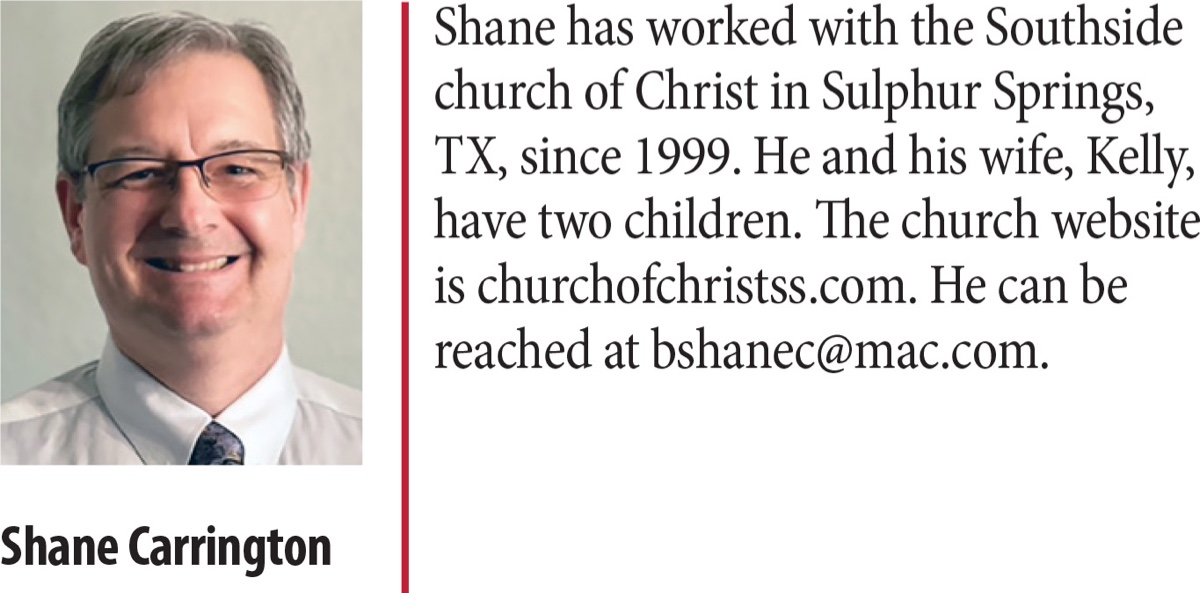By Shane Carrington
Synopsis: The Holy Spirit bears fruit in disciples as we listen to His teaching in Scripture and apply that word diligently in our lives.
People love the mystical. See what thrives at the box office. Stories abound concerning superheroes, wizards, witches, spirits, and ghosts. Science fiction and fantasy inundate our culture. Some also want to sensationalize our service to God.
Frances Chan, in his book, Forgotten God: Reversing Our Tragic Neglect of the Holy Spirit, writes, “. . .many of us don’t need more knowledge about the Spirit from a cerebral vantage point—what we need is experiential knowledge of His presence” (Chan, 36). He then proceeds to tell stories of people which he claims have experienced exactly that.
Can you imagine a gospel preacher actually advocating Chan’s idea that God empowers us in some mysterious way to fight temptation? What if a brother said, “You’ve got to feel it, I know, it’s not a popular word, but there it is. You’ve got to feel that. I actually feel a little tingle on my palm. That went a little too far, but I do. I do. I do. He is filling me with what I need to do this. . . . We’re talking about the fuel that powers you”? Would those statements be biblical? Should we not be concerned about this kind of teaching?
Jack Wilkie, author of the book Church Reset, said on his website, “. . .if the Fruit of the Spirit is just the result of me trying my hardest to obey. . .” rather than just relying on the Holy Spirit to produce fruit in us, we are missing the point. He further stated that “. . .fruit is and always has been, the natural external growth that shows what lies within. . . .” He then says that by relying on the Holy Spirit to produce the fruit in us, as opposed to “trying my hardest to obey,” “the burden is taken off of us” (Wilkie, Focus Press Blog, 3/23/2017). He believes we need a direct operation of the Holy Spirit—apart from the written word of God—for God to produce that fruit in us.
Neither Wilkie nor Chan believe that the word of God is sufficient. Such a mystical view of the Holy Spirit’s work contradicts Jesus, who told disciples to,
Bear fruit. . . abide in Me. . . bear much fruit, and so prove to be My disciples. . . abide in my love. . . If you keep My commandments, you will abide in My love. . . (John 15:1-10).
Jesus also said,
If you continue in My word, then you are truly disciples of Mine; and you will know the truth, and the truth will make you free (John 8:31-32).
God is involved in the fruit that true disciples bear, but the Spirit does not bear the fruit for us. God gives us opportunity, instruction, and encouragement, urging us to participate in His will for disciples. Through these means God nourishes us, grows us in Christ, and helps us produce fruit for His glory.
Rick Atchley preached a sermon in 2006, in which he claimed that the Holy Spirit told him, way back in 1994, that he needed to quit being a coward and start advocating the use of mechanical instruments to worship God. If, like Rick, brethren travel the route of feelings over the written word, how long will it take for that kind of reasoning to lead them to use mechanical instruments in worship—and other unbiblical practices?
The Bible reveals that the Holy Spirit inspired and empowered certain ancient disciples (see previous article). The purposes of these miracles were to reveal and confirm the word of God. Today the Holy Spirit convicts, converts, and strengthens us through the written word that was completed long ago (John 16:7-15; 17:17; 20:30-31; Eph. 3:2-5; etc.). The gospel is the “power of God” that saves and transforms us to be like Jesus (Rom. 1:16-17; 10:17; 12:1-2; 1:5; 16:26). Looking for mystical avenues for spiritual strength is unbiblical.
As disciples of Jesus, we understand that the Holy Spirit is integral to our justification, transformation, and eternal glorification (John 16:7-15; etc.).
Living “by the Spirit” will lead us away from a life dedicated “to the flesh” (Gal. 5:16). If we have been planted and born again by the Spirit (John 3:1-5; 1 Pet. 1:22-25)—and rooted in, watered by, and pruned by the Spirit (John 15:1-10; 16:7-15)—we will have the fruit of the Spirit produced in us (Gal. 5:22-23). This list is beautiful, powerful, and far-reaching in our lives: “love, joy, peace, patience, kindness, goodness, faithfulness, gentleness, self-control.”
This fruit is the opposite of (and an antidote for) “the works of the flesh” (Gal. 5:19-21). While those works are clearly condemned and condemning (Gal. 5:21), “there is no law” (Gal. 5:23) against the fruit of the Spirit. A life lived in harmony with the Holy Spirit’s teaching is healing in our relationship with God and fellow believers (Gal. 5:22-26). A life lived in carnality leads us away from both God and faithful disciples (Gal. 5:19-21,26).
God provides the foundation for our spiritual growth, without which we could not even be disciples of Jesus. He sent Jesus to redeem us through His foresight and grace. In Scripture, Jesus teaches us by word and example what it means to be children of God. When He ascended, Jesus and the Father sent the Holy Spirit to reveal the Father’s plan and the Son’s redeeming work in words we can understand (Rom. 1:16-17). The Holy Spirit also revealed God’s plan for our transformation that we might be more like Jesus (Rom. 8:29-30; 12:1-2; 1:5; 16:26). In Galatians, that transformation is described as growth away from “the works of the flesh” and into the nine-fold “fruit of the Spirit” (Gal. 5:13-26). The Spirit bears this fruit in us as we “have crucified the flesh with its passions and desires” (Gal. 5:24), “walk by the Spirit” (Gal. 5:16,25), treat others in a godly manner (Gal. 5:26), “are led by the Spirit” (Gal. 5:18), and repent away from the practice of sin and toward obeying God’s will (Gal. 5:21-23). The Holy Spirit fosters our bearing of fruit when we use the tools He has made available (Eph. 6:17; John 15:1-10).
Three of these tools are the written word (Eph. 4:15; 6:17; 3:3-5), prayer (Eph. 6:18), and the spiritual relationships that we share with fellow Christians (Eph. 4:1-16; Eph. 3:14-19). Through these, may we “lay aside the old self” and “be renewed in the spirit of (our) mind(s)” in order to “put on the new self, which in the likeness of God has been created in righteousness and holiness of the truth” (Eph. 4:22-24).
What happens when people crave mystical movements of the Holy Spirit outside what He revealed in the written word? How far are they willing to go? Consider another telling example.
In 2014, Lauren King became a preaching intern in a congregation in Tennessee. Her justification for this was revealing. She appealed to her feelings, saying,
The Lord also made it clear, through a lot of discernment and a lot of prayer, that I was supposed to pick up a preaching emphasis. . . . A lot of the ways that I’ve been perceiving the Lord’s voice is through having peace when I walk through open doors. If I have an unpeaceful heart, then that’s not really where I’m supposed to be, but if I’m at a place where I have peace about where I’m going, then that’s the Lord telling me, yes” (King, Quoted in Seek the Old Paths Blog, 1/2015).
Trying to read “the Lord’s secret will” like tea leaves leads away from Scripture and God (Deut. 29:29; John 20:31-32; etc.). When people appeal to emotions as proof of the Spirit’s work within them, they have left the Holy Spirit’s teaching in Scripture and are using a fleshly approach to God. This is incredibly dangerous.
The work of the Holy Spirit is neither focused on bodily sensations nor emotions. His work centers on conviction, conversion, and transformation—through the word He revealed by inspiration (John 16:7-15). Apply His word to your life, and through this, He will enable you to bear spiritual fruit. Trust the Spirit’s inspired, written word. Trust no one who elevates feelings above Scripture.
Chan, Francis. Forgotten God: Reversing Our Tragic Neglect of the Holy Spirit. Ontario, Canada: David C. Cook, 2009.
Gwinn, Greg, and Jacob Gwinn. “Woman Preacher at 4th Ave Church of Christ.” The Virtual Bible Study. Columbia, TN: CollegeVue Church of Christ. December 11, 2014. https://vimeo.com/thevirtualbiblestudy. https://vimeo.com/114312987.
Robinson, Garland M. “Women Preachers?” Seek the Old Paths (blog), 26.1 (January 2015). http://www.seektheoldpaths.com/stop115.htm#WP.
Wilkie, Jack. “Why We Should Stop Tip-Toeing Around the Holy Spirit.” Focus Press (blog), March 23, 2017. https://www.focuspress.org/2017/03/23/stop-tip-toeing-around-holy-spirit/.


